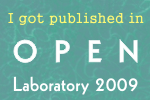So there have been a few reactions to my latest post on accountable research software, including a Tweeter kerfuffle (again). Ever notice how people come out really aggressive on Twitter? Must the the necessity to compress ideas into 140chars. You can’t just write “Interesting point you make there, sir. Don’t you think that your laudable goal would […]
Preamble: this post is inspired by a series of tweets that took place over the past couple of days. I am indebted to Luis Pedro Coelho (@LuisPedroCoelho) and to Robert Buels (@rbuels) for a stimulating, 140-char-at-a-time discussion. Finally, my thanks (and yours, hopefully) to Ben Temperton for initiating the Bioinformatics Testing Consortium. Science is messing around with […]
It is with no inconsiderable degree of reluctance that I decline the offer of any Paper from you. I think, however, you will upon reconsideration of the subject be of opinion that I have no other alternative. The subjects you propose for a series of Mathematical and Metaphysical Essays are so very profound, that there […]
Genomics is a new and exciting programming language based on Brainfsck. Here are the commands: g Move pointer to the right. e Move pointer to the left. n Increment the cell at the pointer. o Decrement the cell at the pointer. m Jump forward past the matching i if the cell at the current pointer […]
If you have a merged file of paired-end reads, here is a quick way to read them using Biopython: from Bio import SeqIO from itertools import izip_longest # Loop over pairs of reads readiter = SeqIO.parse(open(inpath), “fastq”) for rec1, rec2 in izip_longest(readiter, readiter): print rec1.id # do something with rec1 print rec2.id # do something […]
Warning: NSFW language. Brainfuck is a Turing-complete programming language consisting of eight commands, each of which is represented as a single character. > Increment the pointer. < Decrement the pointer. + Increment the cell at the pointer. – Decrement the cell at the pointer. . Output the ASCII value of the cell at the pointer. […]
MIRA is a really cool sequence assembly software, developed and maintained by Bastien Chevreux. MIRA has a large and active community, led by the funny and gracious Bastien, for whom no problem is too small, or too large. Recently MIRA seemed to have developed a stochastic bug, one of those which are a serious headache […]
Postdoctoral Research Scientist Rutgers University Joint Appointment: Institute of Marine and Coastal Sciences, BioMaPS and Dept. of Biochemistry and Microbiology Two 2-3 year Postdoctoral Research Scientist positions are available. We are looking for young scholars with experience in the areas of computational biology. In the scope of this project, we will uncover how the metal-containing […]
So you received your mate-paired reads in two different files, and you need to merge them for your assembler. Here is a quick Python script to do that. You will need Biopython installed. #!/usr/bin/env python from Bio import SeqIO import itertools import sys import os # Copyright(C) 2011 Iddo Friedberg # Released under Biopython […]





